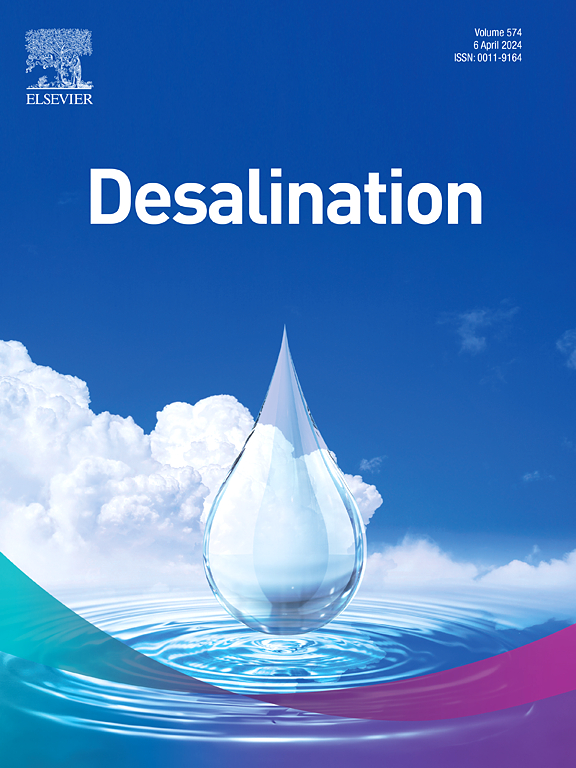Development and optimization of Janus nanofiltration membranes for simultaneous removal of divalent cations and anions in water desalination
IF 9.8
1区 工程技术
Q1 ENGINEERING, CHEMICAL
引用次数: 0
Abstract
The development of nanofiltration membranes capable of simultaneously rejecting divalent cations and anions is still a major challenge in water desalination, as traditional mono-charged membranes can only effectively reject either cations or anions. In this study, Janus nanofiltration membranes with dual-charged selective layers were prepared for addressing this limitation. For the first time, 3-methylaminopropylamine (MAPA) was introduced as a small-molecule aqueous monomer, while 3-aminobenzenesulfonic acid (m-ABS) an additive, in combination with polyethyleneimine (PEI) and 1,3,5-benzenetricarbonyltrichloride (TMC) via once and twice interfacial polymerization (IP) processes for Janus membranes fabrication. Optimization by response surface methodology yielded membranes with divalent salt rejections exceeding 96 % for MgCl₂ and Na₂SO₄, and water permeability over 6.5 L·m−2·h−1·bar−1. The incorporation of m-ABS improved hydrophilicity and anti-fouling properties. Moreover, the prepared Janus nanofiltration membranes can keep operational stability over 80 h. Compared to conventional approaches, this work provides a new idea for the development of Janus nanofiltration membranes with enhanced separation performance, offering promising potential for efficient seawater and brackish water desalination.

同时去除海水淡化中二价阳离子和阴离子的Janus纳滤膜的研制与优化
由于传统的单电荷膜只能有效地过滤阳离子或阴离子,开发能够同时过滤二价阳离子和阴离子的纳滤膜仍然是海水淡化的主要挑战。在本研究中,制备了具有双电荷选择层的Janus纳滤膜来解决这一限制。首次将3-甲基氨基丙胺(MAPA)作为小分子水溶液单体,将3-氨基苯磺酸(m-ABS)作为添加剂,通过一次和两次界面聚合(IP)工艺与聚乙烯亚胺(PEI)和1,3,5-苯三羰基三氯化物(TMC)结合制备Janus膜。通过响应面法优化得到的膜对MgCl₂和Na₂SO₄的二价盐去除率超过96%,透水性超过6.5 L·m−2·h−1·bar−1。m-ABS的掺入提高了材料的亲水性和防污性能。此外,制备的Janus纳滤膜在80 h内保持稳定运行。与传统方法相比,本研究为开发分离性能更好的Janus纳滤膜提供了新的思路,为高效海水和微咸水的脱盐提供了广阔的前景。
本文章由计算机程序翻译,如有差异,请以英文原文为准。
求助全文
约1分钟内获得全文
求助全文
来源期刊

Desalination
工程技术-工程:化工
CiteScore
14.60
自引率
20.20%
发文量
619
审稿时长
41 days
期刊介绍:
Desalination is a scholarly journal that focuses on the field of desalination materials, processes, and associated technologies. It encompasses a wide range of disciplines and aims to publish exceptional papers in this area.
The journal invites submissions that explicitly revolve around water desalting and its applications to various sources such as seawater, groundwater, and wastewater. It particularly encourages research on diverse desalination methods including thermal, membrane, sorption, and hybrid processes.
By providing a platform for innovative studies, Desalination aims to advance the understanding and development of desalination technologies, promoting sustainable solutions for water scarcity challenges.
 求助内容:
求助内容: 应助结果提醒方式:
应助结果提醒方式:


